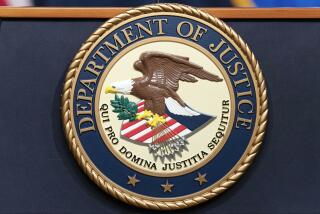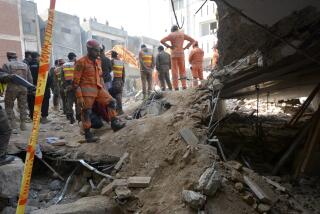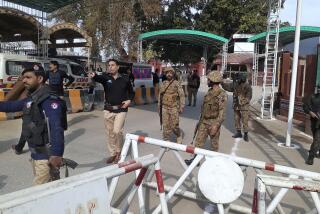Times Square bomb suspect had ties to key Pakistani militants
- Share via
Reporting from Washington — Faisal Shahzad, the would-be Times Square bomber, grew up in a Pakistani family whose circle of acquaintances included two future militants — a Taliban leader and one of the participants in the 2008 terrorist attack in Mumbai, India, a government source said Friday.
Officials now believe this family background may help explain why Shahzad, after immigrating to the United States, grew radicalized and allegedly contacted the Pakistani Taliban via the Internet. The group would have welcomed him because as a naturalized U.S. citizen, he could easily travel to and from Pakistan.
Agents interviewing Shahzad, 30, who lived in Connecticut, also learned that he was upset over repeated CIA drone attacks on militants in Pakistan, his native country. He was also troubled by marital and financial difficulties and a foreclosure on his home, said the government source, who has been briefed on the investigation. He spoke on the condition of anonymity because the investigation is continuing.
The revelations provide fresh indications that the Pakistani Taliban — in the past mainly concerned with fighting the Pakistani government — has broadened its focus to include the U.S. by encouraging Shahzad to detonate a Nissan Pathfinder in New York last week.
But it remained unclear whether Shahzad’s Internet contact with the Taliban was an attempt to volunteer, or whether the militants reached out to him.
“What we don’t know is if he was actively recruited by these guys or if he recruited himself,” said a second source, a senior U.S. official.
But, the senior official said, if the Taliban has widened its focus to carry out attacks on the United States, then “it would change the game.” He added that it could force the U.S. to reassess the threat it faces from Pakistan and how best to respond.
Shahzad was arrested late Monday night after boarding a flight at New York’s JFK International Airport. He was charged Tuesday with five criminal counts, including attempting to use a weapon of mass destruction. He faces life in prison if convicted.
He has not appeared in court, and no defense attorney has appeared on his behalf, signs that Shahzad is cooperating with the FBI and counter-terrorism interrogators.
In the criminal complaint, FBI Special Agent Andrew P. Pachtman said that Shahzad confessed to trying to blow up his SUV loaded with propane gas and fertilizer, and that he had “recently received bomb-making training in Waziristan, Pakistan.”
In addition, records showed that he last returned to the U.S. from Pakistan on a one-way ticket on Feb. 3 after he said he spent five months in that country. He told airport security officials in a secondary screening that he had gone to Pakistan to visit his parents.
But it has since been learned that Shahzad was driven by Sheikh Mohammed Rehan, a known militant, from Karachi to the turbulent border city of Peshawar in July 2009, and then on to the Waziristan area and its training camps there. Rehan was arrested in Pakistan this week with several others, and Shahzad’s father, Bahar Ul Haz, was questioned but not arrested.
Ul Haz is a retired air vice marshal in Pakistan, who, the government source said, knew Baitullah Mehsud, a leading militant in Waziristan with the Taliban. He is thought to have once led some 5,000 jihadists in struggles against the Pakistani government.
Although Mehsud’s death has never been officially confirmed, it has been reported that he was gravely injured in an Aug. 5 drone attack in South Waziristan, and died three weeks later. That would have occurred around the time that Shahzad was in the Waziristan area.
It also was learned that Shahzad knew one of the militants involved in the November 2008 attack in Mumbai, where a resort hotel, hospitals and a movie theater were bombed and people were shot to death. At least 173 people were killed.
It was not known which Mumbai attacker Shahzad knew. The source described the man only as someone Shahzad knew when he was a child.
The Pakistani Taliban initially claimed credit for the attempted Times Square bombing, then retracted the claim while suggesting it had other efforts underway to attack the U.S. The group has made such claims in the past, and they have been dismissed by intelligence agencies.
Until now, the U.S. has carried out a covert campaign of airstrikes against militant groups in the border region and funneled aid to Pakistan’s government and armed forces, while relying largely on Pakistani forces to conduct ground operations.
The U.S. official said discussions about possibly employing new military or diplomatic options would become serious only if the Obama administration revised its assessment of the Pakistani Taliban. Even then, sending large numbers of U.S. troops is not considered a likely option, largely because of the Pakistani government’s continued opposition to the idea.
Currently only a few hundred U.S. military personnel — mostly Special Forces trainers — are in Pakistan.
More to Read
Sign up for Essential California
The most important California stories and recommendations in your inbox every morning.
You may occasionally receive promotional content from the Los Angeles Times.












